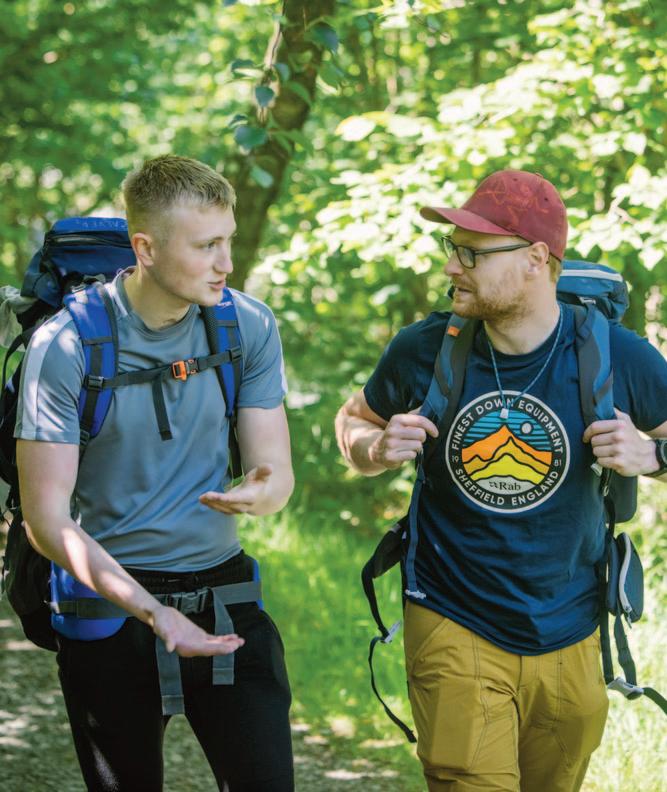
calvertreconnections.org.uk
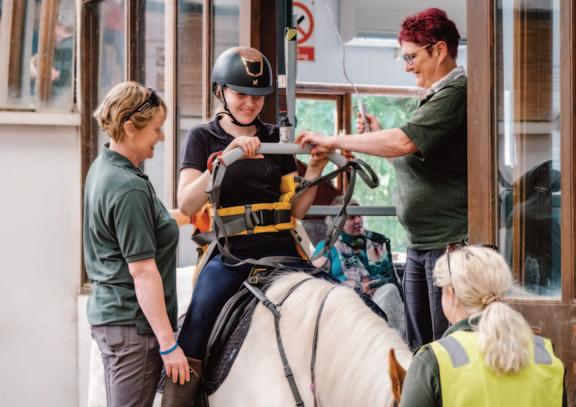

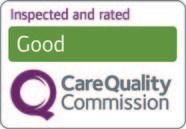
Clinical Outcomes Report 2023
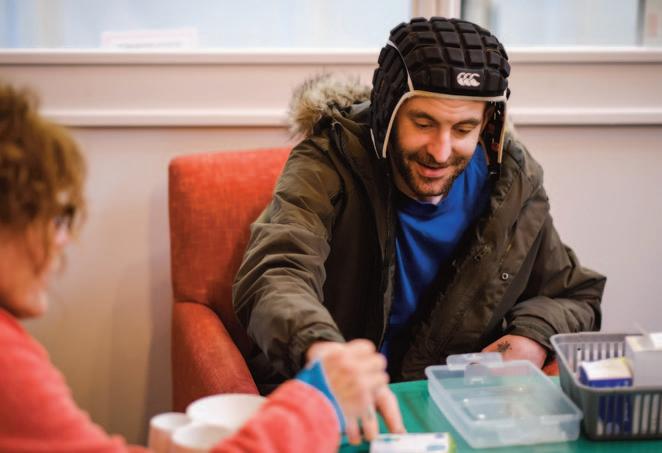
Calvert Reconnections is an innovative Acquired Brain Injury (ABI) neurorehabilitation centre based in the Lake District. Our unique evidence-based approach combines clinical therapy with vocational and outdoor activities to inspire and support people so they maximise their potential.
Calvert Reconnections
Contents Welcome . . . . . . . . . . . . . . . . . . . . . . . . . . . . 1 What? . . . . . . . . . . . . . . . . . . . . . . . . . . . . . . . 2 Who? . . . . . . . . . . . . . . . . . . . . . . . . . . . . . . . 4 How? . . . . . . . . . . . . . . . . . . . . . . . . . . . . . . . 6 The Team . . . . . . . . . . . . . . . . . . . . . . . . . . . . 8 Transitioning Out of Service . . . . . . . . . . 10 Clinical Outcome Measures . . . . . . . . . . . 12 Life After Reconnections . . . . . . . . . . . . . 16 Case Study - Mark . . . . . . . . . . . . . . . . . . . 17 Case Study - Nick . . . . . . . . . . . . . . . . . . . . 18 Reconnections in the Press . . . . . . . . . . . 19 The Future . . . . . . . . . . . . . . . . . . . . . . . . . 20
Welcome to our 2023 Clinical Outcomes Report
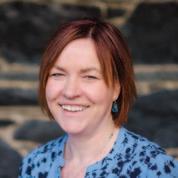 Claire Appleton Head of Service
Claire Appleton Head of Service
Over the last 12 months, Calvert Reconnections has firmly established itself as an integral part of the ABI rehab community, welcoming more participants than ever before and achieving a widerange of outstanding outcomes.
As a service, we are constantly striving to expand the horizons of what’s possible with ABI rehabilitation.
We are very aware that people with ABI can sometimes find the set procedures of neuro-rehabilitation too clinical, inflexible and impersonal. At Reconnections, our unique approach combines cognitive and physical rehabilitation with vocational and outdoor activities delivered within a unique non-clinical environment. We support people to become the best they can be through an outstanding team including Neuro Occupational Therapists, Neuro Physiotherapists, Neuro Speech and Language Therapists, Neuro Psychologists, Clinical Psychologists, Positive Behaviour Support Practitioners and Rehabilitation Coaches.
Our service has also received external recognition in recent months. Calvert Reconnections was shortlisted for Rehab Provider of the Year at the Personal Injury Awards with the centre also achieving a Good rating in our first CQC inspection. The CQC report praised Reconnections for being “consistently managed and well-led”. It said the service promotes “high-quality, person-centred care” and is “open, inclusive and empowering”, adding that people are “supported to have maximum choice and control of their lives” in order to “gain independence”.
Most importantly of all, we have welcomed participants of all ages to our groundbreaking rehab programme. Being part of the changes to their lives has been a privilege and the feedback from family and professionals involved has been inspirational. We are proud to share their stories.
Clinical Outcomes Report 2023 1
What?
Calvert Reconnections is a neuro-rehabilitation centre for people with ABI. Based in a specially-adapted residential centre on the outskirts of Keswick in the Lake District, our expert clinical therapy team combines cognitive and physical rehabilitation with vocational and outdoor activities delivered within a unique non-clinical environment.
‘Cheers for making my stay with you so enjoyable. I had such fun and enjoyed getting stuck in’
2023 participant
Drawing on over 40 years of expertise from the wider work of the Lake District Calvert Trust, at Calvert Reconnections we tailor our programmes around the individual needs of our participants, working closely with them to establish their goals and develop a personalised rehabilitation plan that helps achieve them. Innovative and evidencebased, our approach involves an interdisciplinary team of Neuro Physiotherapists, Occupational, Speech and Language Therapists, Psychologists and Outdoor Practitioners working together to maximise a participant's physical and cognitive potential while improving their daily living skills.
At Calvert Reconnections, we believe in doing things differently. At our unique neuro-rehabilitation centre, we bring together the beauty and benefits of the great outdoors with the very best in person-centred care — delivered in an enjoyable, homely environment that inspires and supports people to become the best they can be.
ABI is life-changing. It can leave people feeling lost, apprehensive and reliant on others. At Calvert Reconnections, we help people face and embrace their new normal. Enabling them to discover their passion and find new ways to connect. Empowering them to push perceived limitations and become more independent.
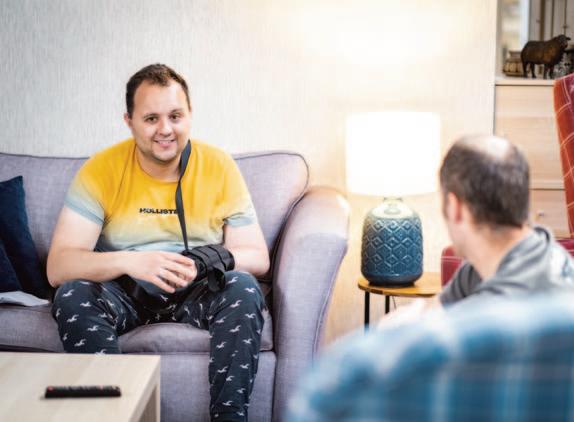
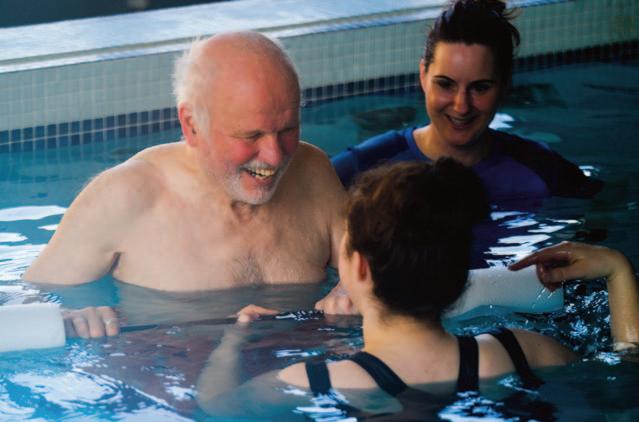
2 Calvert Reconnections
In 2023, milestones achieved include:
‘Good’
in our first CQC rating
1 50% increase in occupancy compared to 2022
1 00%
Of the participants who completed the IROC at admission and discharge, 100% reported a maintained or improved hope for the future
70%
Of the participants who completed the IROC at admission and discharge, 70% reported an improved sense of purpose and direction in their life
1 6-35
The Reconnections team expanded from 16 to 35 staff members
1 0
We’ve introduced 10 new activities to our rehabilitation programme including music, art, go karting, pool nights and trips to local safari parks
5
We’ve worked with five external partners around the county to offer participants vocational and volunteering experiences
We now have a permanent Speech and Language Therapist on the team
We welcomed a Positive Behaviour Specialist to the team
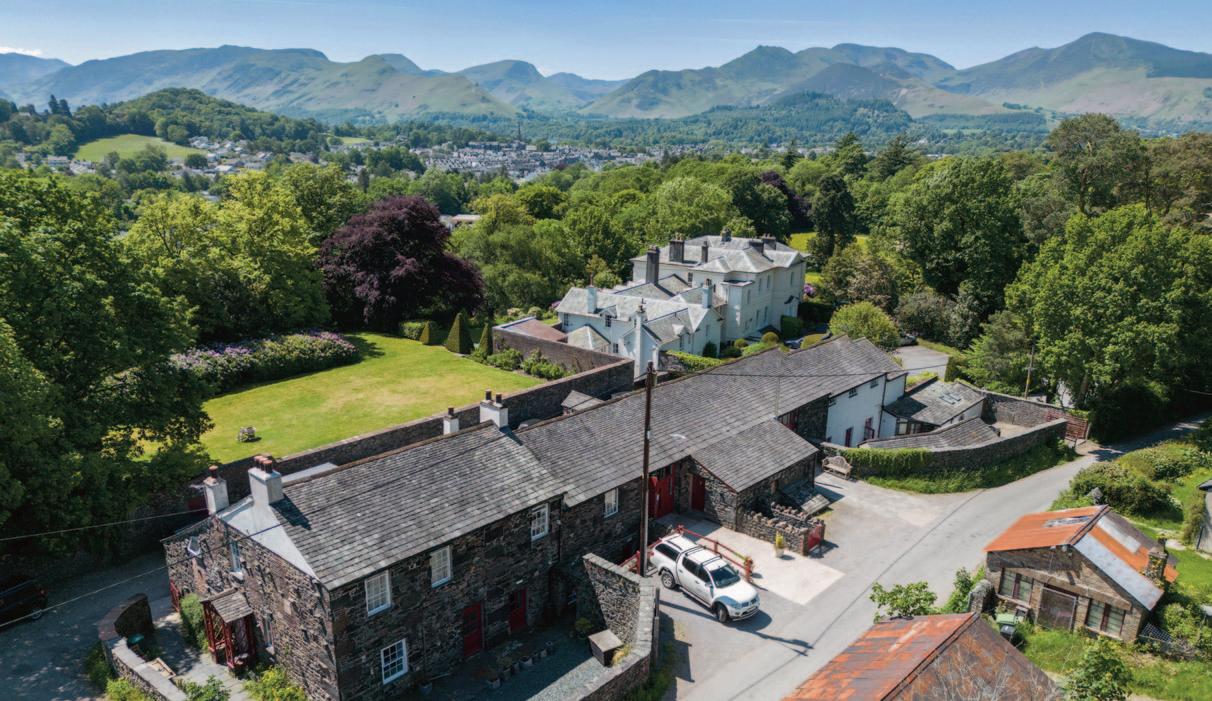
Clinical Outcomes Report 2023 3
Who?
Calvert Reconnections welcomes a diverse range of ABI survivors.
– Individuals with an ABI – 17yrs +
– Medically stable
– Post acute and longer term ABI
– Have other injuries and associated needs, including polytrauma and mental health
– Behaviours that can be challenging, due to the brain injury
Due to the personalised nature of each individual programme, we have so far been able to adapt to work with a variety of ages. This has ranged from 17 to 73 years old.
In 2023, most of our participants had a Traumatic Brain injury. The breakdown is as follows:
4 Calvert Reconnections
Type of brain injury 90% Traumatic Brain Injury 5% Stroke 5% Other (Birth Injury) Participant profile (Age) 40% 17-24 20% 25-34 15% 35-44 10% 45-54 5% 55-64 10% 65 or over Participant profile (Gender)
85% 15%
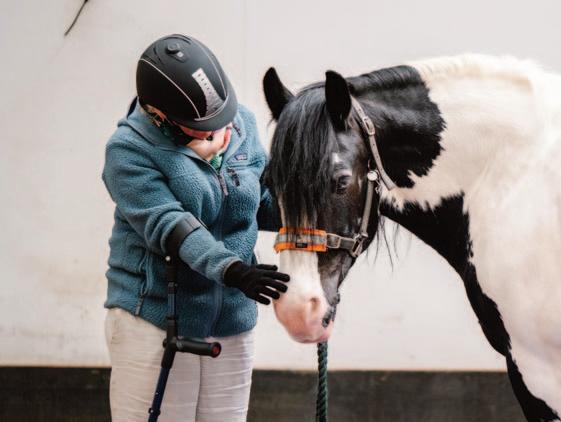
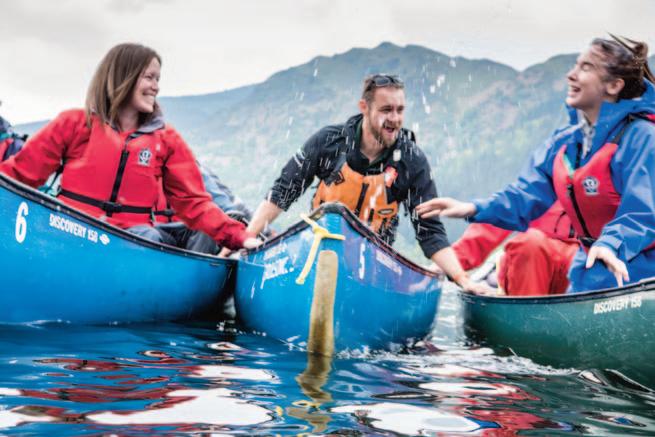
Post code analysis
Being based in the stimulating English Lake District, you’d be forgiven for thinking we draw exclusively from the north of England. In reality, we receive referrals from all over the UK.
In 2023, referrals came from the following areas:
Other (Isle of Man)
Clinical Outcomes Report 2023 5
North West 20% South West 10% South East 5%
65%
How?
A safe and supportive place, our 9-bed residential centre and two independent living flats welcome people with ABI for stays ranging from a few days to several months. Here our specialist and experienced team spend time getting to know our participants within a peaceful lakeland environment.
Together, we devise and implement a bespoke rehabilitation programme designed to stimulate their senses, build neurological pathways and set them on a journey towards improved physical, cognitive development and mental health. People with ABI can often focus on what they have lost, sometimes feeling their challenges are insurmountable and their goals too far away. At Calvert Reconnections, we invite them to try new things, to build upon what they can do, not what they can't. To recognise their achievements and feel good about themselves. To ensure they leave us in a better place than when they arrived.
Examples of activities
In 2023, we delivered 260 sessions and used the following activities to deliver ground-breaking rehabilitation:
– Fell-walking
– Canoeing
– Bushcraft
– Abseiling
– Climbing
– Aquatic Therapy
– High ropes course
– Orienteering
New for 2023
– Music
– Art
– Yoga
– Pilates
– Mindfulness
– Go-Karting
– Lego building sessions
– Pool tournaments
– Quiz nights
– Safari park trips
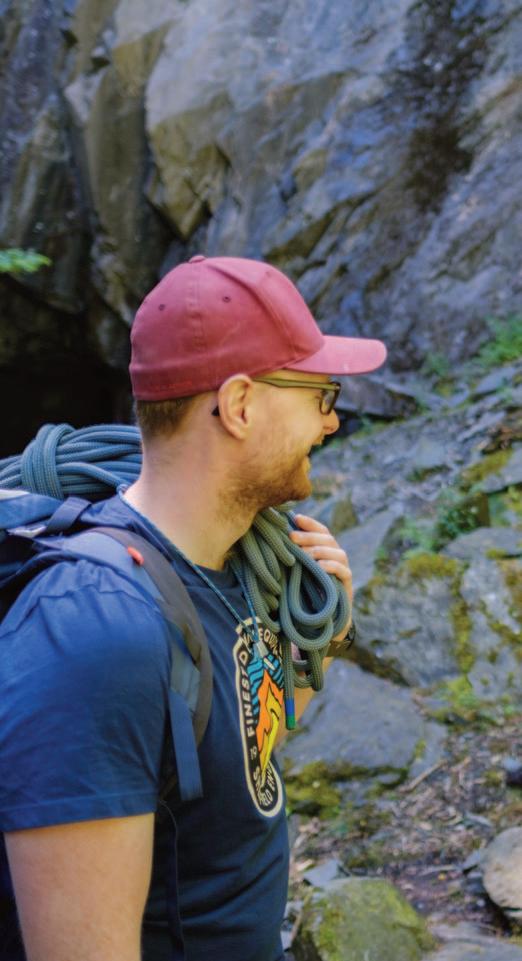
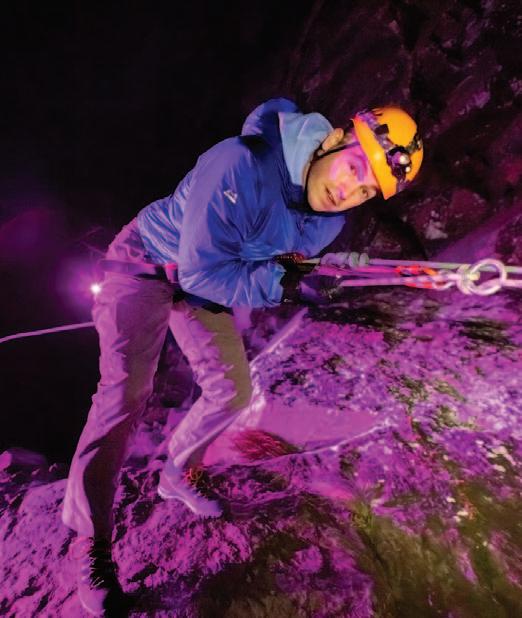
6 Calvert Reconnections
© Rob Grange Photography
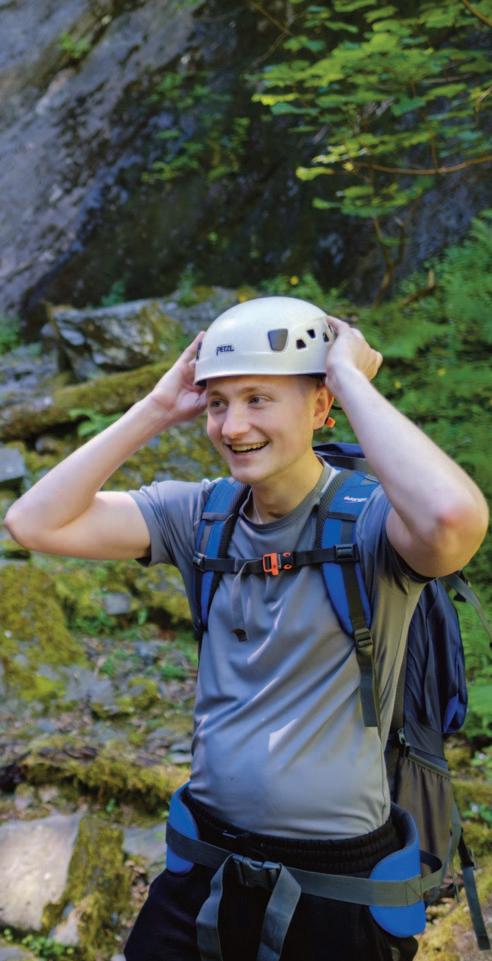

In 2023:
Average length of stay
% Other (Birth Injury)
14 Weeks
What goals did our participants set?
– Meaningful Occupation
– Caring for family members
– Work related skills
– Healthy eating
– Impulse control
– Structure and routine
– Mental health
– Activities of Daily Living
– Physical
– Cognition
– Fatigue and/or sleep
– Social Interaction and Behaviour
– Emotional or Psychological Wellbeing
– Leisure and Recreation
– Communication
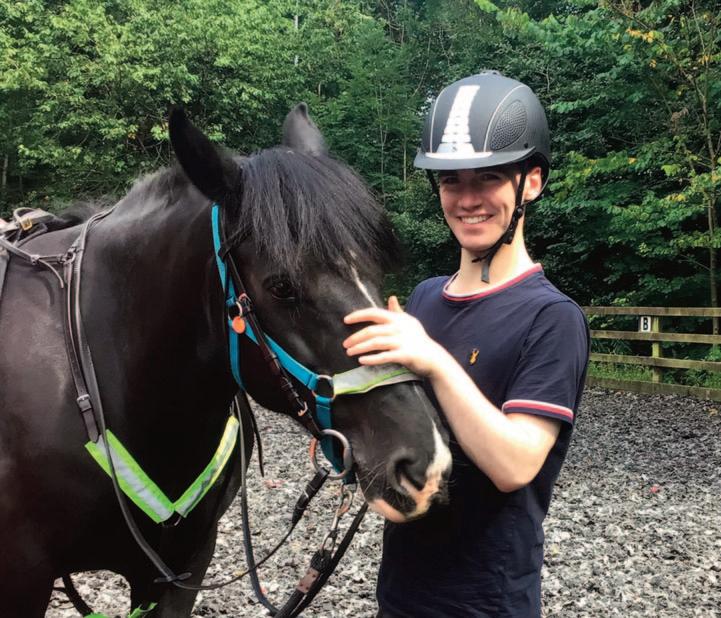
Clinical Outcomes Report 2023 7
The Team
Drawing on over 40 years of expertise from the wider work of the Lake District Calvert Trust, at Calvert Reconnections we tailor our programmes around the individual needs of our participants, working closely with them to establish their goals and develop a personalised rehabilitation plan that helps achieve them.
Innovative and evidence-based, our approach involves an interdisciplinary team of Neuro Physiotherapists, Occupational Therapists, Speech and Language Therapists, Psychologists, Positive Behaviour Practitioner and Rehab Coaches with outdoor activity qualifications, working together to maximise a participant’s physical and cognitive potential while improving their daily living skills.
In addition, we worked closely with the wider services at Calvert Lakes and Stables as well as local community partners to offer a challenging and varied programme.
In 2023, milestones include:
— Our Clinical Team has grown from 4 to 10, while our Care Team has increased from 8 to 12
— We welcomed a Positive Behavioural Practitioner to our team
— We increased provision across all therapies and on-site input from Clinical Psychology and NeuroPsychology.
— Our Care Team has been strengthened, providing waking night cover and flexibility to accommodate our participants’ varied support needs.
— We welcomed our new Speech and Language Therapist, who has become an integral team member
— Every participant has a clinical key worker. The clinicians develop and deliver a goal oriented programme, directly participating alongside participants in the outdoor activity elements of the programme as well as providing one to one and group therapy sessions.
Almost all of our participants leave having gained a new interest in a valued and purposeful activity that they intend to continue in their own community, serving as a focus for ongoing rehabilitation, self-esteem and community participation.
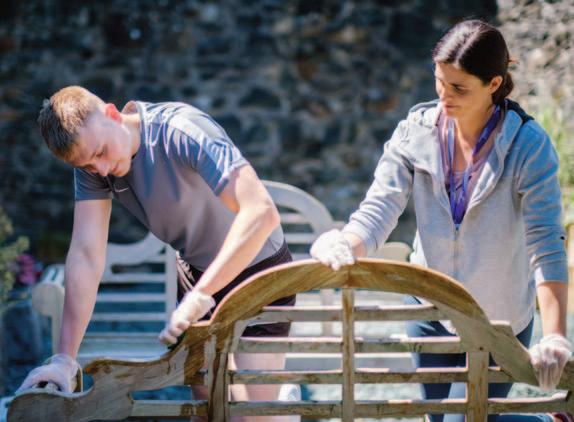

8 Calvert Reconnections
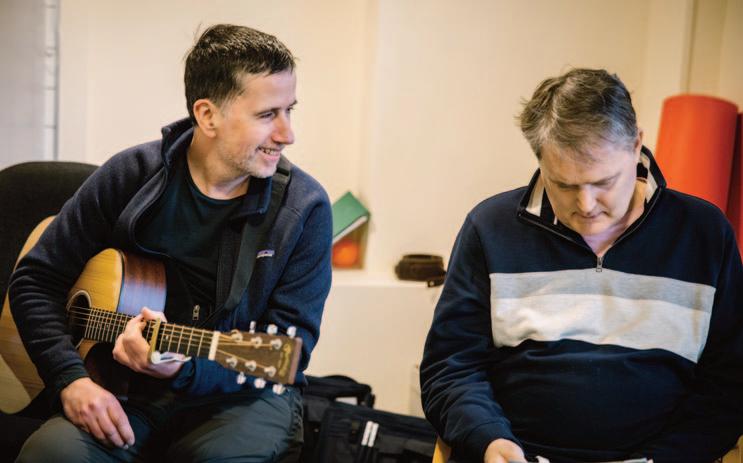
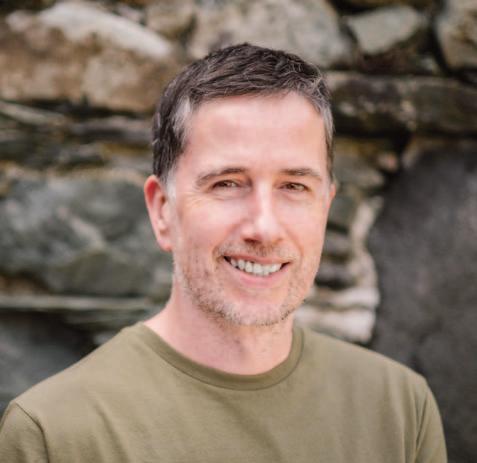
Spotlight on Promoting Positive Behavioural Support
Our Positive Behaviour Support (PBS) Practitioner works alongside the team to ensure our participants can develop a Positive Behavioural Support Plan and that this approach is embedded across our service. Where behavioural challenges may not be a factor, this approach has been blended to encompass Positive Support Plans, through which our participants are supported to develop their person centred profiles of support and future goals.
Since our PBS Practitioner joined the team, the majority of our participants have valued working with this approach, this being evidenced by their enthusiastic engagement with the person centered process and production of truly collaborative documents to support their rehabilitation and transition back to their community. The participants’ comprehensive PBS plans have helped define the nature of support that works for them. Feedback on sharing these plans with onward providers has been very positive, helping to target support. Working with participants in our residential setting allows for in-depth work in formulating and refining their plans. These plans help participants define the approach and support that works best for them, to identify what is important to them, their triggers and contributing factors and develop proactive positive behavioural and recovery support plans.
‘Having my PBS Plan will help staff know how to support me with my behaviours and how I can help myself’
‘It’s been very beneficial and helpful’
2023 participant
Clinical Outcomes Report 2023 9
Transitioning Out of Service
Independent Living
If a participant’s chosen goal is to achieve independent living, we have two fully selfcontained flats where they can take time to practice the life skills they’ll need.
We have two separate one bedroom flats, in addition to our 9 bedrooms in the main centre building.
These flats can offer a wide range of living set-ups depending on an individual’s needs and goals. Individuals could progress into living independently, learning the skills required, or could already be living on their own and just needing some rehabilitation input.
Either of the two flats can also be used for shorter assessment periods, to ascertain what support someone would need in order to move on to independent living. These flats can be utilised flexibly to provide whatever a person needs to work on their independent living skills.
In 2023:
Activities of Daily Life (ADL) can be built, managed and developed throughout a participant’s stay (whether in a flat or in the main building).
Development of skills could include, but aren’t limited to:
— Cooking
— Cleaning
— Washing
— Sleep Hygiene
— Routine
— Vocation
— Managing safety and risk
25%
identified independent living as a ‘goal’
Of those:
— 20% have successfully transitioned onto independent living without additional support
— 60% have achieved this with additional support
— 20% have not achieved independent living and reset their goals during their stay. The experience has helped them to either
a) more clearly define their support needs at transition home or
b) decide with Reconnections and their referring team what provision is best suited to them
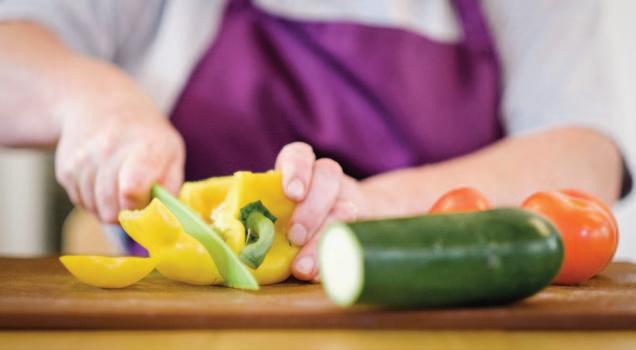
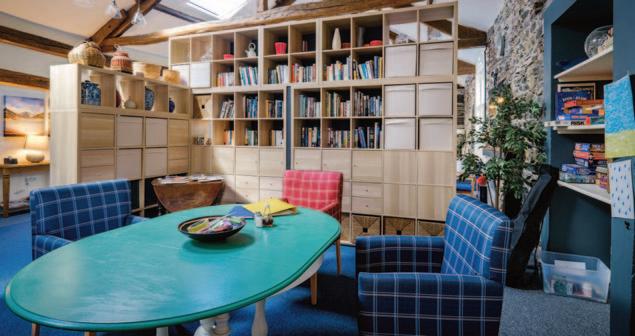
10 Calvert Reconnections

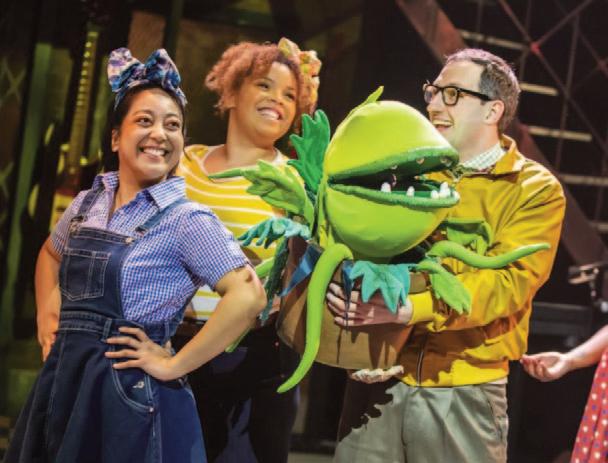
Vocational activities and Volunteering
Another key aspect of our rehabilitation programme are the vocational opportunities we are able to offer through partnership working.
In 2023, we worked with the following local businesses and organisations to offer participants vocational opportunities that resonated with them:
— Theatre by the Lake, Keswick
— Lowther Castle & Gardens
— Booths Supermarket, Keswick
— Calvert Stables
— Keswick Museum
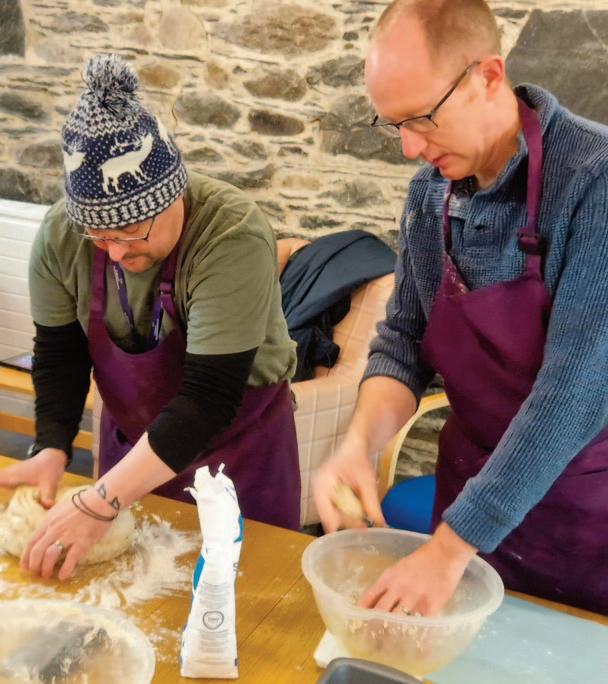
In 2023:
25% volunteered with one of our partners
Of those:
— 25% continued into ongoing volunteering
— 25% continue to volunteer but have also secured paid employment with a second partner
— 25% returned to pre-existing volunteering and also to their pre-existing employer with support from our rehabilitation team to regain confidence in work related skills

Scan to learn more about our Independent Living flats
Clinical Outcomes Report 2023 11
Clinical Outcome Measures
Rehabilitation goals are embedded throughout our programme.
In order to establish a baseline from which to monitor changes and evaluate the impact of our interventions, we use three valid and reliable outcome measures with our participants.
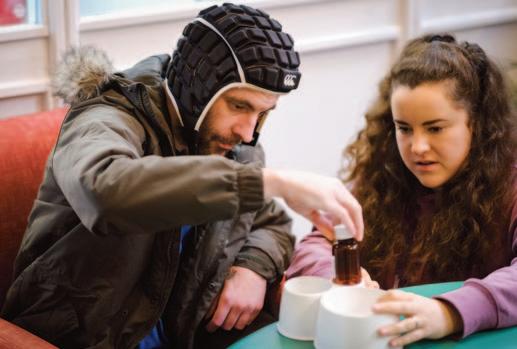
These are:
The Functional Independence Measure and Functional Assessment Measure (FIM FAM) as a global measure of disability.
The Mayo-Portland Adaptability Inventory (MPAI-4) as a measure that assesses specific problems that people may encounter specifically after an acquired brain injury.
The Individual Recovery Outcomes Counter (IROC) which is a tool designed to measure and support the wellbeing and mental health of our participants.
The majority of our participants see an improvement in their overall exercise tolerance and stamina. Functional gain is evident in outcomes. Liaison and handover with local teams is prioritised and participants leave with clear direction for onward progression or maintenance.
The Mayo-Portland Adaptability Inventory
The Mayo-Portland adaptability inventory (MPAI-4) is a measure that assesses the range of physical, cognitive, emotional, behavioural, and social problems that people may encounter after an ABI.
In 2023:
The mean scores for our 20 participants who were assessed with this scale show improvements in all subscales. Lower scores indicate less severe difficulties.
12 Calvert Reconnections
Subscale Mean Admission Score Mean Discharge Score Ability 40.5 32.5 Adjustment 46 37 Participation 40 36
Activities of Daily Living
Our participants arrive with varied aspirations and expectations for improving or maintaining their skills in activities of daily living. It has been rewarding for the team to work alongside them as they explore their potential. Currently we are celebrating with a participant who has progressed through our service to moving from our Independent living flat into his own rental property, living independently for the first time with transitional outreach from Reconnections.
Residential rehabilitation at Reconnections allows for participants to be supported to develop and expand their domestic and instrumental ADL skills. A number of our participants had yet to develop these skills prior to their brain injury — having acquired
their brain Injury before they were able to establish their skills in these domains or where their pre-admission support has not enabled facilitation of these skills.
At Reconnections we strive to offer a programme that incorporates challenges to taking responsibility, assisting others and team work, with opportunity to gain skills and confidence.
We can see the results of this element of rehabilitation in the Extended Activities of Daily Living section of the Functional Independence and Functional Assessment Measure (FIM FAM), which covers domestic and instrumental activities of daily living.
FIM FAM - Outcomes for Extended Activities of Daily Living
Clinical Outcomes Report 2023 13
FIM/FAM Admission Goal Discharge Meal Preparation 4 5 5 Laundry 5 6 7 Housework 3 5 6 Shopping 3 5 5 Home Finances 2 3 3 Work/Education 4 4 6 Total: 21 28 32 On Admission
On Discharge 19 Mean score 26 Mean score A higher score indicates greater independence and functional gain
Example of a participant gains reflected by the FIM FAM (Extended
Activities of Daily Living)
IROC: Individual Recovery Outcomes Counter
IROC wellbeing is an outcomes based approach for services to support personal recovery.
Participants complete the IROC at admission and this is a useful tool for self-rating and also serves as informal goal generation. Longer stay participants will also complete at transition out of the service.
100%
Of the participants who completed the IROC at admission and discharge, 100% reported a maintained or improved hope for the future
70%
Of the participants who completed the IROC at admission and discharge, 70% reported an improved sense of purpose and direction in their life
‘Calvert, the tranquility of the centre and the surrounding fells, was the perfect place. Your kind, caring, amazing staff worked wonders, and we are so grateful’
2023 participant’s family member
14 Calvert Reconnections
Clinical Outcome Measures
Opportunity Empowerment People Health Skills Comfort Health &Activity Directi o n Mental Life Safety & Physical Exercise Purpose & 1 2 3 4 5 6 H o pe for Self Participation Valuing Social Person a l t h e Future Management &Control Myself Network Netwo r k Home Opportunity Empowerment People Health Skills Comfort Health &Activity Directi o n Mental Life Safety & Physical Exercise Purpose & 1 2 3 4 5 6 H o pe for Self Participation Valuing Social Person a l t h e Future Management &Control Myself Network Netwo r k
Home
Completed IROC example 1 Completed IROC example 2
Mobility Outcomes
A variety of mobility and balance measures are used according to an individual’s deficit. The Community Balance and Mobility Scale (CBMS) is used to measure an individual’s balance deficits which potentially affect their engagement in the community, and for those who have reached the ceiling effect of the Berg Balance Scale. This functional balance measure is particularly relevant for many of our participants who are actively engaging in the community around them.
The High Level Mobility Assessment Tool (HiMAT) is another standardised outcome measure specifically developed for individuals with ABI used to measure motor performance in participants with high level balance and mobility deficits.
On average there is a 30% change in balance and mobility scores across the CBMS, BERG Balance and HiMAT.
This is based on the 75% eligible participants who completed balance and mobility outcome measures at both the start and end of their stay. 29%
‘I just wanted to take the opportunity to thank the team for their dedication, expertise, their skills, efforts and knowledge that has made the experience so positive, enjoyable and productive’
2023
participant’s family member
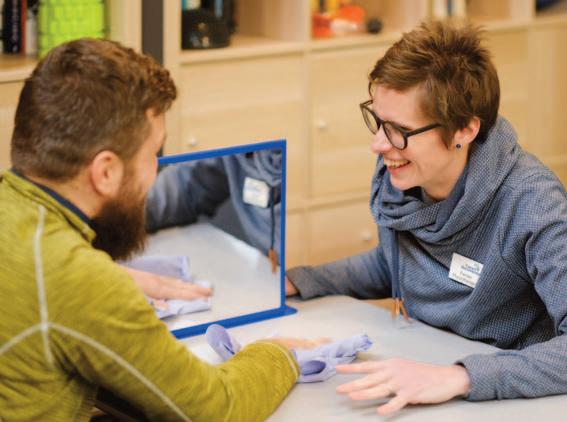
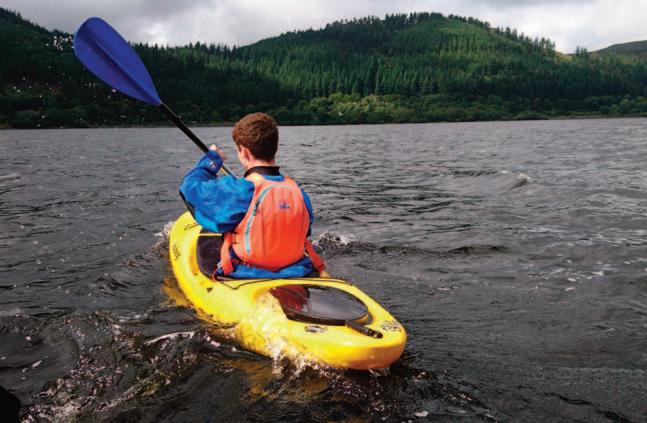
Clinical Outcomes Report 2023 15
Average improvement in CBMS
Average improvement in Berg Balance score 13% Average improvement in HIMAT score
Average change across outcome measures
48%
30%
Life After Reconnections
Our aim is to break the mould in neuro-rehabilitation and to:
– be increasingly recognised as leaders in our field
– continue to promote the benefits of combining outdoor activities with high-quality, interdisciplinary neurological rehabilitation and support
‘I am so grateful and feeling happier, which was one of my goals. You are all a really wonderful, brilliant team’
2023 participant
– ensure our individual approach and skills help more people with ABI reach their potential and make a positive difference in as many lives as possible
Participants have progressed on to
1 0% paid employment
55% vocational training/volunteering/ community activity
35% other/considering options
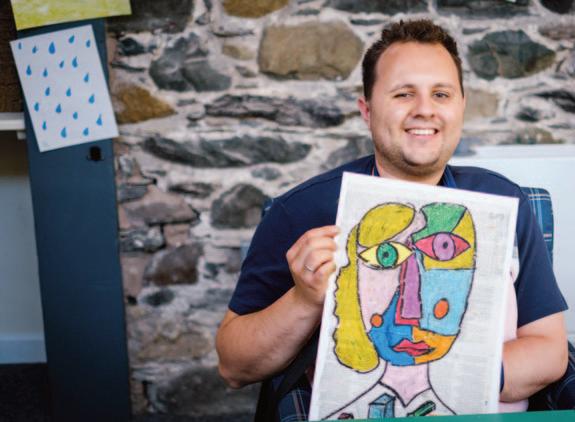
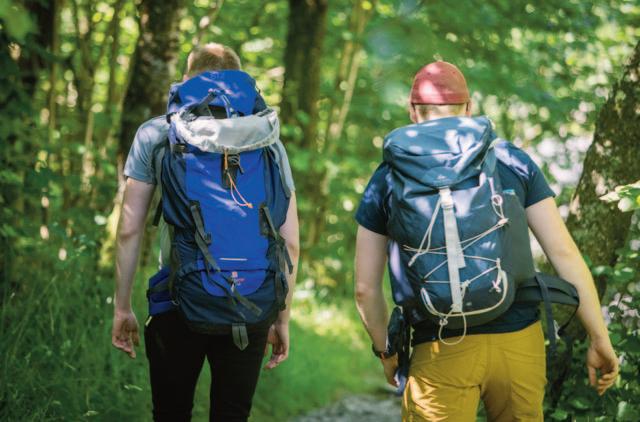
16 Calvert Reconnections
Case Study
Mark
I’m ready to face the world again says brain injury survivor
A 41-year-old brain injury survivor says he is “ready to face the world again” after a successful programme of rehabilitation at Reconnections.
Mark, from Shropshire, suffered a severe traumatic brain injury in 2018. He was medically retired from his job as a Facilities Manager in 2021 and spent eight weeks at Reconnections.
“When my case manager brought me to Reconnections for a look around, I immediately felt at home,” explained Mark. “Although the centre doesn’t look or feel like a hospital, the clinical expertise is outstanding.”
Mark’s rehabilitation programme focused on cognitive and physical rehabilitation alongside daily living and vocational skills within the local community.
Working with Reconnections’ clinical therapy team, his programme covered fatigue management, coping strategies to deal with frustration, mental wellbeing and physical fitness; all with the aim of maximising function.
“I’ve made giant strides in a range of areas –particularly in terms of managing frustration and fatigue,” added Mark.
“By managing my fatigue I’ve significantly improved my fitness.”
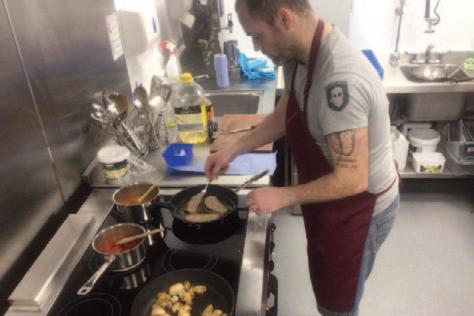
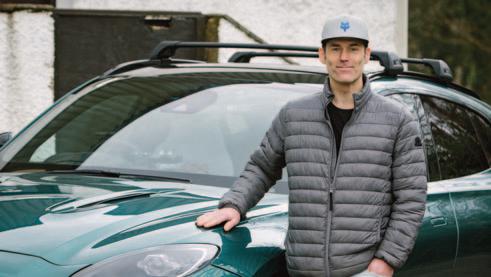
Mark has particularly embraced the outdoor activities available at Reconnections, taking part in fell walking, kayaking, climbing and open water swimming.
“I’ve absolutely loved the way outdoor activities are integrated with clinical therapy,” he continued. “Having the expertise of the clinical staff and rehab coaches is inspiring. The scenery in the Lake District also unbelievable and the mindfulness element of the programme has helped with my concentration and mental flexibility.”
Femke van Schelven, Neurological Physiotherapist at Reconnections paid tribute to Mark’s progress.
“Mark has achieved so much in eight weeks,” said Femke.
“As well as becoming physically fitter, he is now able to manage his fatigue.
“Having previously avoided social situations, he is also now collecting his children from school and enjoying day trips with his family.”
As he returns home to his wife and two children (not forgetting the family dog!), Mark also believes his time at Reconnections has improved his ability to carry out everyday activities.
“Dealing with busy crowds and interacting with people doesn’t seem so daunting anymore. The team at Reconnections have been absolutely phenomenal. They’ve given me a new sense of purpose and direction. I’m ready to face the world again.”

Scan to meet Mark and learn more about our approach to rehabilitation
Clinical Outcomes Report 2023 17
Case Study Nick
Brain injury survivor says new approach to rehab has transformed his life
A 21-year-old man who suffered a horrific brain injury in a road traffic accident says a groundbreaking new approach to rehabilitation has transformed his life.
Nick, from Birmingham, was a pillion passenger on a motorcycle when it was struck by a speeding car in December 2017.
Nick was in a coma for 11 days and spent two months in Birmingham Children’s Hospital. On two occasions his parents were told that he wouldn’t survive his injuries.
“I was thrown 60 yards through the air and nearly died as a result of my injuries,” explained Nick.
“After being discharged from hospital, I couldn’t control my behaviour. I was on the wrong path, full of resentment, anxiety, depression and anger. I didn’t feel like my life was worth living. I hit out at those closest to me. I was in physical and mental turmoil.”
In May 2023, Nick began a nine-month programme of residential brain injury rehabilitation at Calvert Reconnections.
Continued Nick:
“Going into a clinical, hospital style environment wouldn’t have worked for me. I would have hated every single minute.
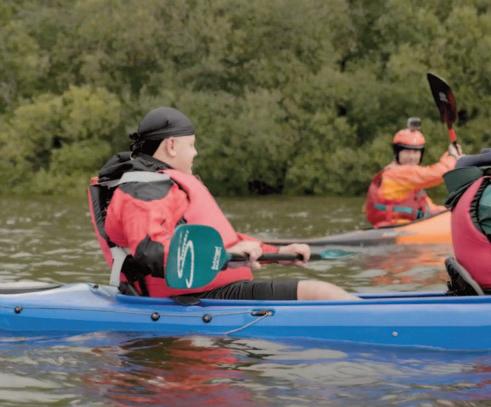
“At Reconnections, my rehab plan involved activities such as fell walking and canoeing. It didn’t actually feel like rehab, but my body started to respond, both mentally and physically. I’ve achieved things I simply didn’t think possible – and I’ve seen others do the same.”
After six months, Nick was able to move from the main centre into one of Calvert’s independent living flats where he has focused on a range of daily living skills. He is now set to move into his own home later this year.
Nick has also also written and recorded a series of songs charting his recovery and started his own YouTube channel to inspire others.
“I feel like my life is worth living again,” he added. “I was in a mess when I arrived at Reconnections. I’d almost given up. After everything I’ve been through, being able to live independently again feels like a miracle. The doctors saved my life but it’s my stay at Reconnections that’s made my life worth living. There’s something very special about their new approach to brain injury rehab.”

Scan to meet Nick and learn more about our approach to rehabilitation
18 Calvert Reconnections
Reconnections in the Press
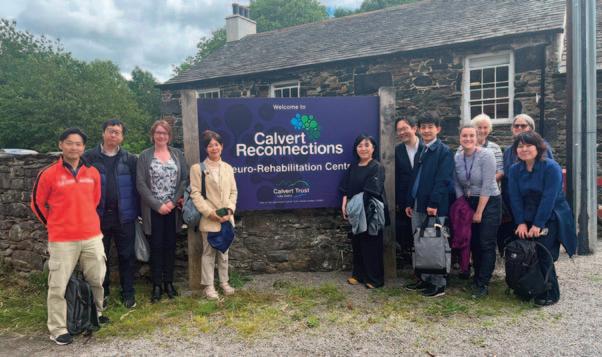
Lights, Camera, Action!
Calvert Reconnections has launched a series of short videos to demonstrate the centre’s groundbreaking approach to ABI rehabilitation.
Brain injury survivor says new approach to rehab saved his life
A 21-year-old man who suffered a horrific brain injury in a road traffic accident says Calvert Reconnections’ new approach to rehabilitation has transformed his life.
Calvert Reconnections celebrates 4th anniversary
Brain injury survivor John Gaimster, who opened Calvert Reconnections in March 2020, has returned to the Keswick-based centre to celebrate its 4th anniversary. Commenting on his visit John said: “Reconnections is a special place with special people achieving special things.”
In a sign of its growing impact, Calvert Reconnections recently hosted a delegation of rehabilitation specialists from Japan. Commenting on their visit, Dai Kiuchi, senior consultant at Mediva, said: “We were inspired by our visit – there’s nowhere like Reconnections anywhere in the world.
Calvert Reconnections achieves Good rating in first CQC accreditation
Calvert Reconnections has received a Good rating from the Care Quality Commission (CQC). Reconnections’ Good rating is particularly impressive as it is the centre’s first CQC inspection.
ABI rehab centre shortlisted for leading industry awards
Calvert Reconnections has been shortlisted for three leading industry accolades at the Personal Injury and NR Times Awards!
Clinical Outcomes Report 2023 19
The Future
It has been a year of huge progress for Calvert Reconnections, with participants of all ages achieving lifechanging outcomes.
As a service, we are committed to providing ground-breaking, evidenced-based rehabilitation without boundaries.
Our aims moving forward are to:
— Strengthen links on discharge to help facilitate better re-integration into the community
— Encourage participants to return for shorter stays to reset, recharge and refocus on goals and targets
— Continue to develop our expertise specifically in psychology and health promotion
— Review and adapt our evidenced-based outcomes measures
— Explore new ways in which technology can help deliver our aims
— Support our previous participants to build a support network and attend our annual reunion in October 2024
— Continue to gain further ABI accreditation including Headway approval
— Work with universities and individuals on research initiatives aimed at shaping rehabilitation services in the future
To make a referral, please visit www.calvertreconnections.org.uk or call 017687 85381.
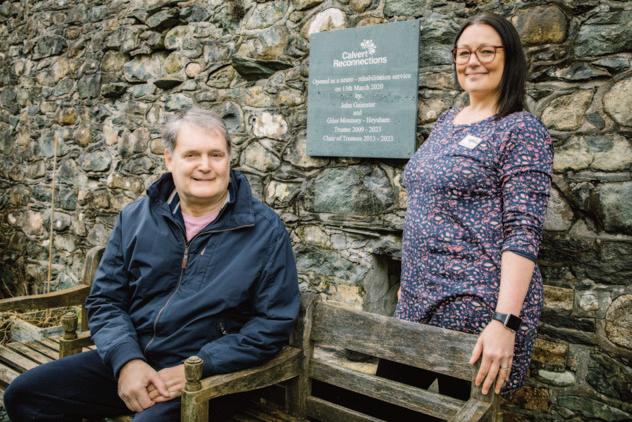

20 Calvert Reconnections
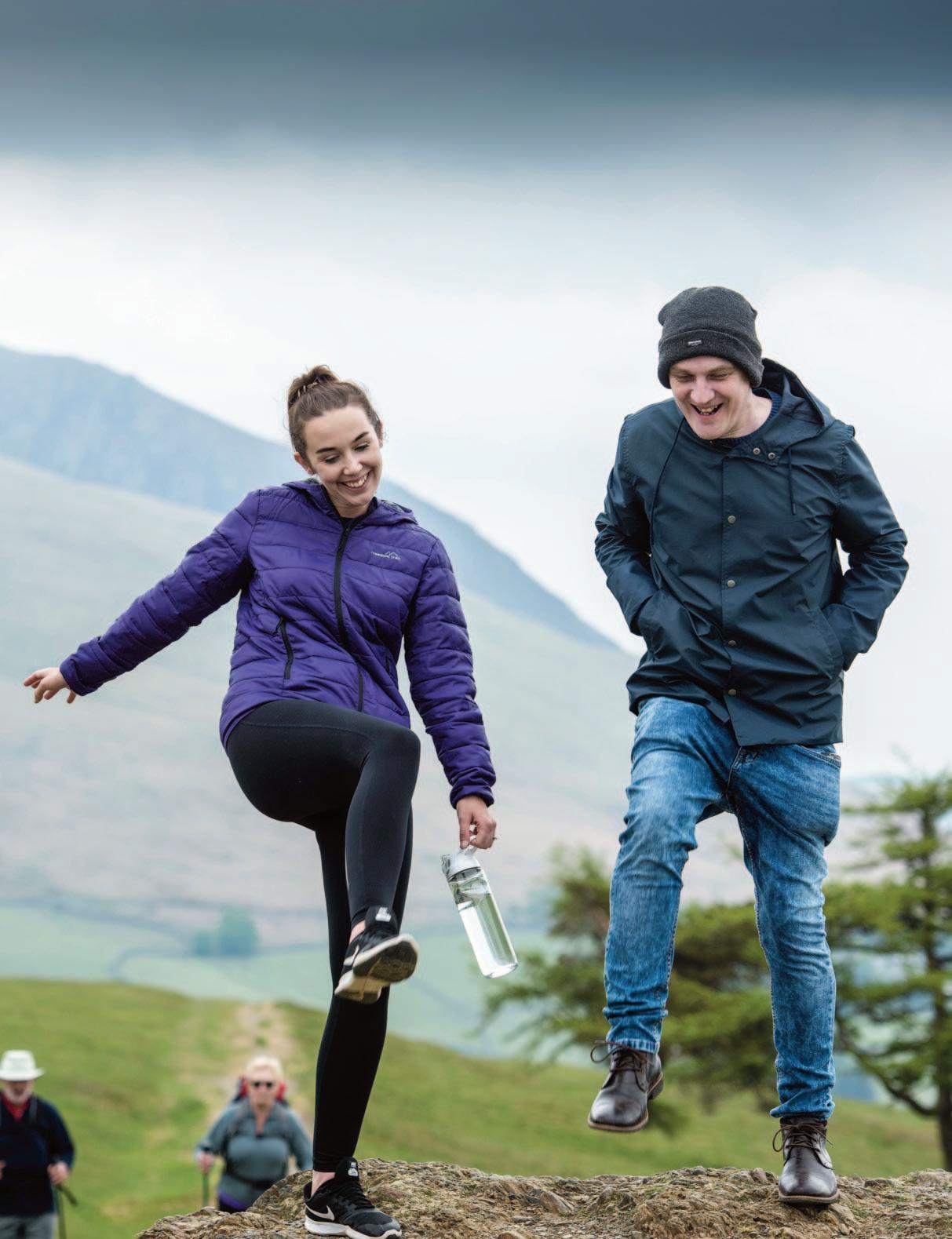
Clinical Outcomes Report 2023
Calvert Reconnections Old Windebrowe Brundholme Road Keswick Cumbria, CA12 4NT T: 017687 85381 E: info@calvertreconnections.org.uk calvertreconnections.org.uk Calvert Reconnections is part of The Lake District Calvert Trust. Registered Charity No. 270923 Company Registration No: 1240160






 Claire Appleton Head of Service
Claire Appleton Head of Service

































